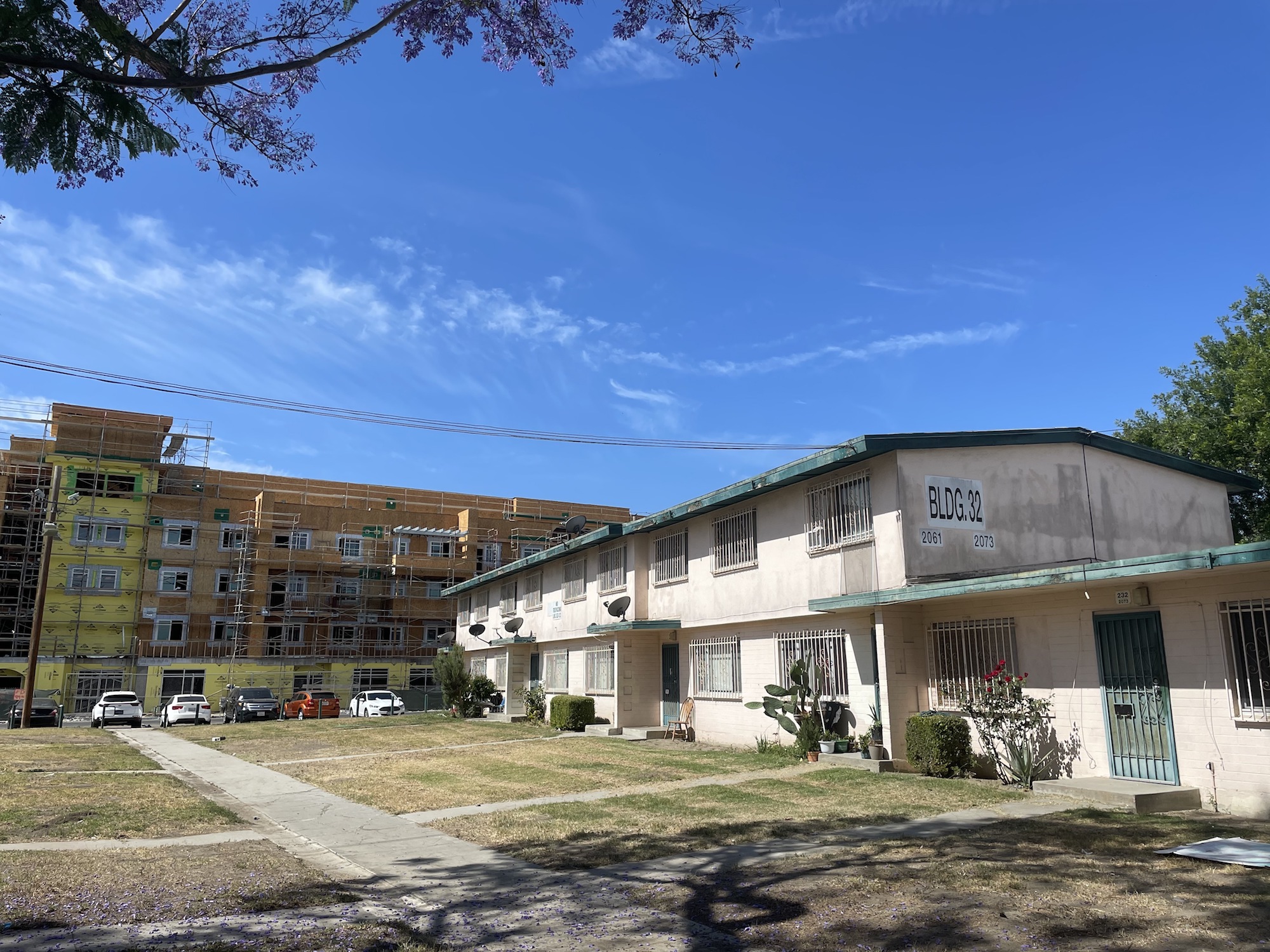The environmental justice fight to block the 2028 Olympics in Los Angeles
Oct 12, 2021
Every four years, thousands of Olympic athletes representing more than 200 countries push the limits of the human body. Close to 4 billion people — more than half the world’s population — have tuned in for each Olympic Games since 2004.
But the Olympics can highlight or exacerbate social and environmental challenges plaguing their host countries. The combination of increased energy, travel, water, and food demands, coupled with the need for new construction, has provoked environmental disasters connected to recent tournaments, from deforestation in South Korea to air pollution in Beijing and illegal dumping in Russia.
Now, however, Los Angeles Mayor Eric Garcetti believes that his city can sidestep these challenges entirely. He says that LA’s games, which are scheduled for summer 2028 and expected to cost $7 billion, will have “no impact” on the city, neither saddling it with burdensome debt nor harming its environment.
While city representatives said in September that many sustainability measures intended to achieve this are forthcoming, some have already been announced. The city’s Olympics committee has pledged $160 million to be disbursed before 2028 in hopes of improving access to sports and park space in underserved communities. Most substantially, they’ve touted a “radical” solution: making the games “no build.”
This means the city will be repurposing existing structures — not building new stadiums — in attempts to save money, limit environmental impacts, and prevent long-time Angelenos from being displaced and outpriced by the increased cost of living that can accompany development. This pledge stands in stark contrast to the building sprees undertaken by most recent Olympics host cities.
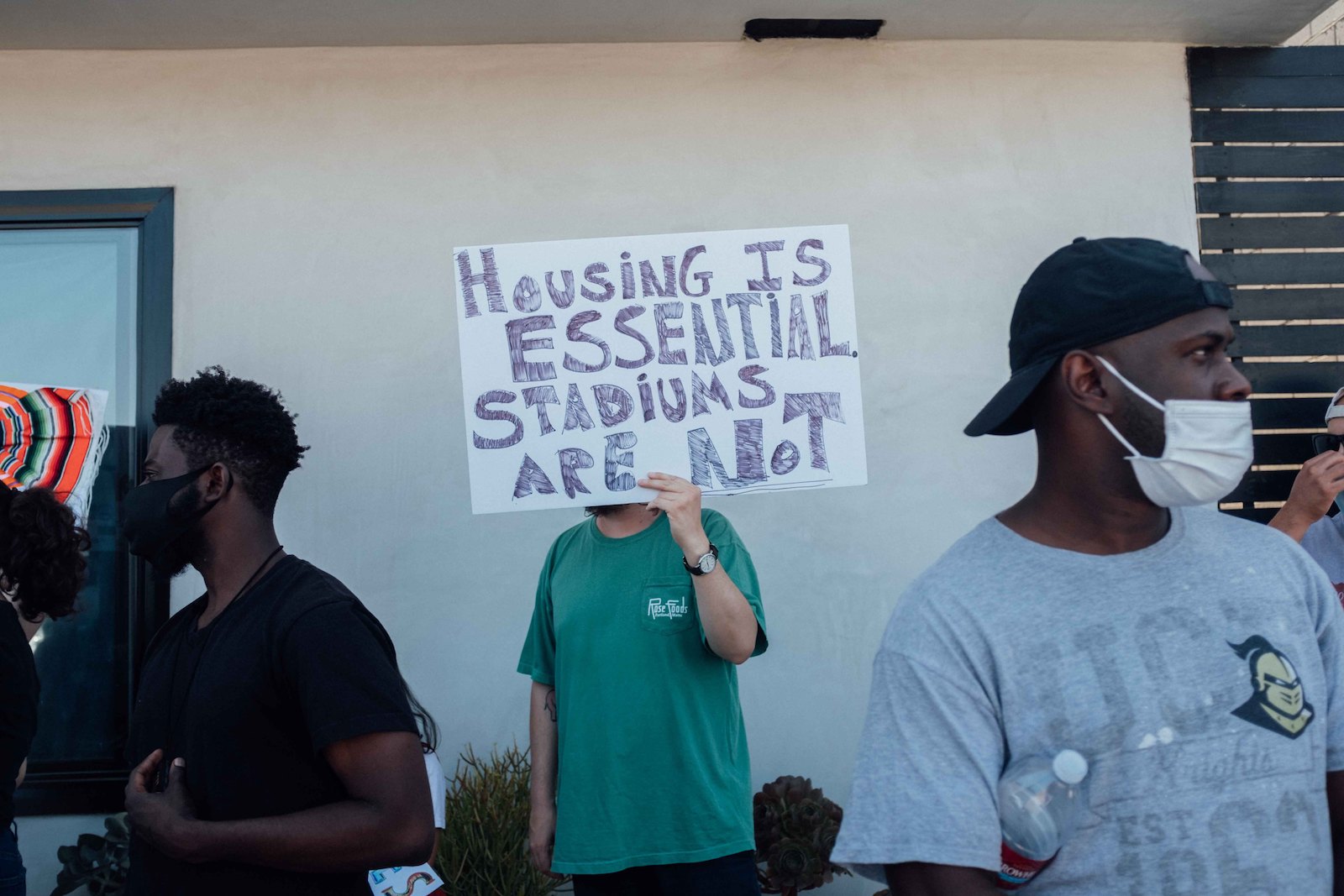
But this pledge is disingenuous, according to local activists. In the last five years, three major sports facilities costing upwards of $8.5 billion — all expected to be used during the Olympics — have been approved in the region, and construction has already been completed on two. The facilities have accelerated air and noise pollution in predominantly Black and brown communities and accompanied skyrocketing rents in one of the state’s last Black enclaves.
LA officials can technically claim no-fault for two reasons: First, the bulk of this construction has taken place in Inglewood, a city within Los Angeles County nestled between two different LA city limits. Second, the stadiums are privately owned. While both of these things are true, the effects on local residents and the environment are much the same as they would be if the city had undertaken construction within its own boundaries.
The issues plaguing Inglewood and LA residents stem from three projects: the SoFi Stadium, Intuit Dome, and a rehauling of the city’s transportation system, all located in what is now known as the Inglewood Entertainment District. Garcetti, who in 2013 notified the Olympic Committee that LA intended to host an upcoming tournament, then publicly supported the building of a sports complex in Inglewood three years later, despite the “no build” pledge he would come to adopt. In 2017, Garcetti said the building of Inglewood’s sports facilities would better allow the world “to honor the shared history of the City of Angels,” while “simultaneously capitalizing on the world’s most technologically advanced stadium (SoFi Stadium) to deliver captivating in-stadium, city-wide and global television events.”
Given that this encouragement has been followed by massive stadium construction in the area, the city’s “no build” pledge rings hollow to local activists, who have mobilized to support Inglewood residents who are poised to feel the development’s effects most acutely.
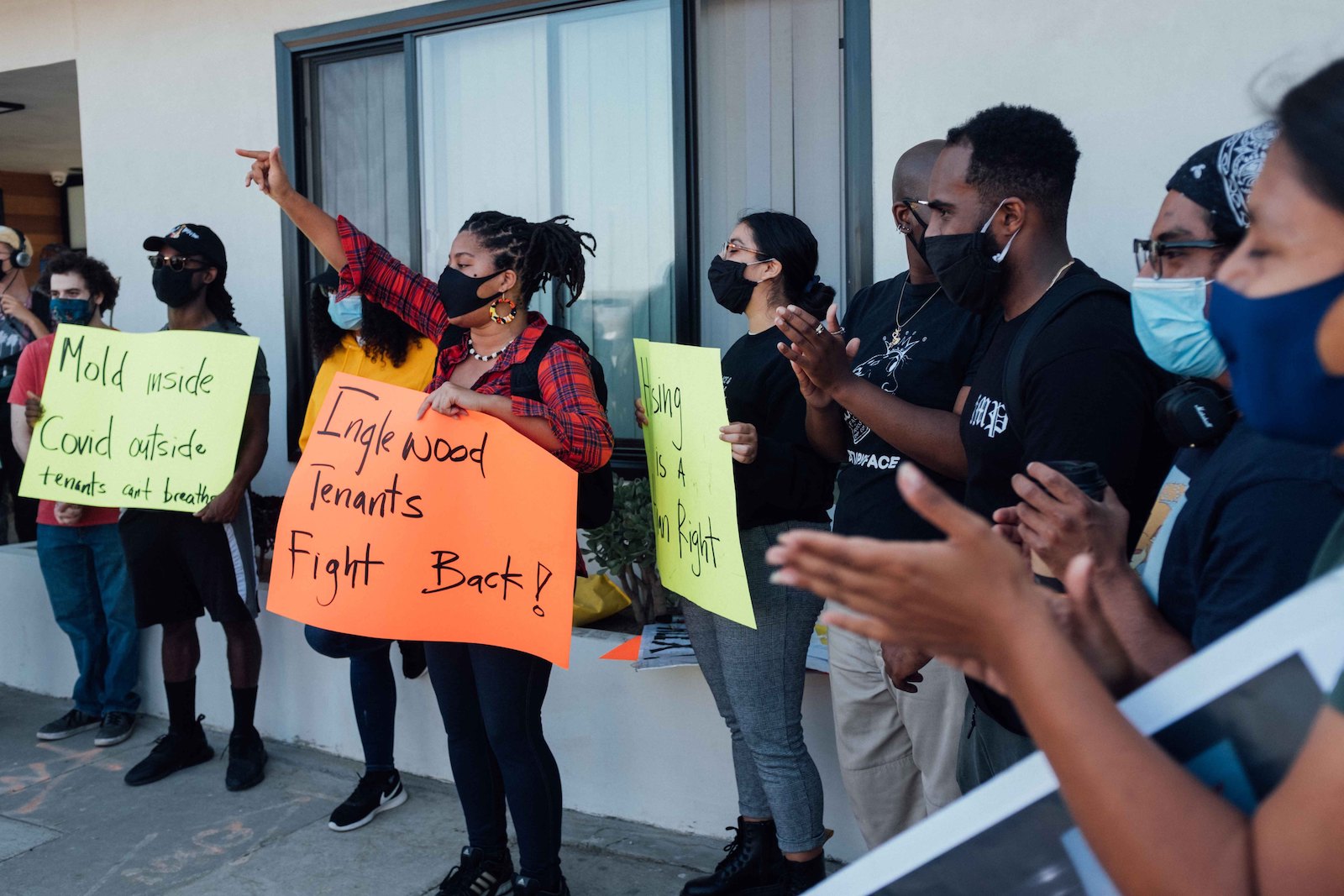
“It’s like fraud,” Alexis Aceves told Grist. Aceves, raised in the unincorporated LA neighborhood of Lennox, which borders Inglewood, has seen the impact of LA’s expansion and Olympic aspirations firsthand. She is a member of the Lennox-Inglewood Tenants Union, or LITU, which has spent the last few years fighting evictions, supporting unhoused residents, and sounding the alarm on how the 2028 games will affect the natural and built environment in the Inglewood area.
According to CalEnviroScreen, an environmental mapping tool maintained by the California Office of Environmental Health Hazard Assessment, the Inglewood community directly surrounding the new sports park faces more environmental burdens, particularly from hazardous waste and air and noise pollution, than 96 percent of the state. The community, which is majority Black and Latino, is sandwiched in between the fourth-busiest airport in the world, the second-largest oil field in LA County, and two of the busiest freeways in the country.
“There is a deliberate effort to unravel and dismantle our community for economic profits because they don’t see the land and the people living here as worth anything,” Aceves said. “They’re trying to act like they just lucked upon already active construction, but there was no way this wasn’t planned.” (Garcetti’s office did not respond to Grist’s requests for comment.)
Work on the sports complex in Inglewood’s entertainment hub first began in late 2016 with the SoFi Stadium, which is set to host the Super Bowl in 2022, the College Football Championship game in 2023, and the opening and closing ceremonies of the Olympic Games in 2028. Last year, amidst the pandemic, the $6 billion stadium was finally completed. As the respiratory pandemic raged on, dust from construction caked neighboring homes and lined the streets. The construction of the facility, approved by California Governor Gavin Newsom as “essential work” during the pandemic’s business closures, led to adverse effects for at least some of the workers, too.
“If our safety was the most important thing,” an anonymous construction worker told the Los Angeles Times in March 2020, “they wouldn’t have us out here.” Ultimately, between March and December of 2020, at least three people lost their lives during construction, including two workers and one homeless man who died due to a “sharp force injury.”
Last month, the Intuit Dome, expected to cost upwards of $2 billion, had its groundbreaking ceremony just a few blocks south of SoFi. The arena, financed by billionaire Steve Ballmer (who has donated nearly half a million dollars to Inglewood Mayor James Butts), has met controversy for side-stepping accountability measures during its environmental impact review and its use of eminent domain — a power of the government to take private property and convert it into public use — to procure 11 properties, including a residential home and former church.
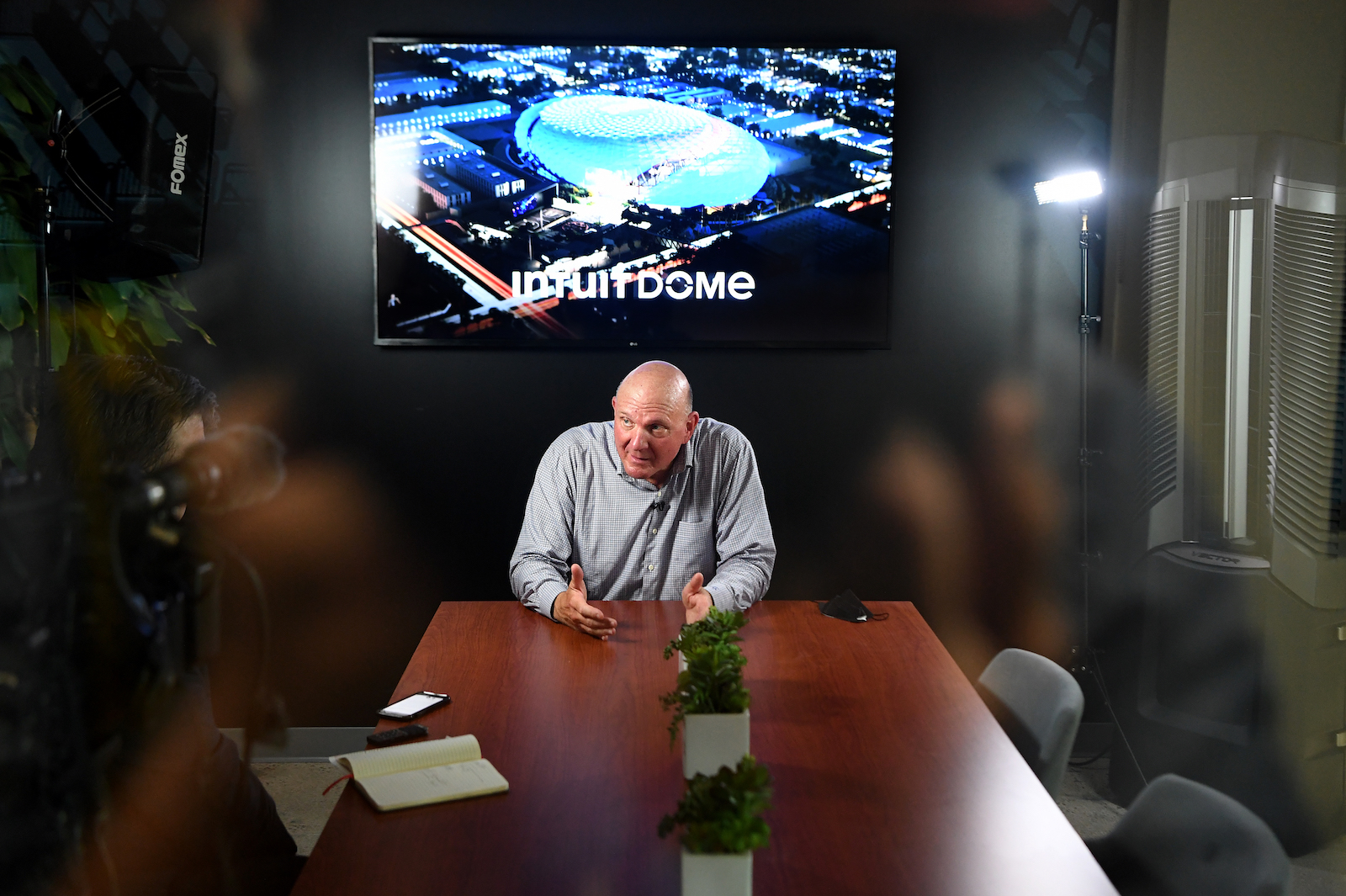
In 2019, Governor Newsom fast-tracked the arena’s legally required environmental review period, offering less time for community input on the project, saying an exemption was justified because the developer arranged extensive carbon emissions reduction plans. The environmental measures included installing 1,350 electric vehicle charging stations, planting 1,000 trees, and buying carbon offset vouchers.
Opponents of the arena have accused Ballmer and the city of “greenwashing” by offering an inflated impression of the sustainability features of the project. According to Ballmer, the Intuit Dome will be the first “carbon-free” sports arena in the world. The facility will reportedly be fully electric and allow fans the opportunity to ‘offset their own carbon impact’ when they buy a ticket to an event.
Critics point out that carbon offsets don’t reduce the actual carbon emissions of an undertaking; they just give money to projects that promise to reduce them elsewhere. They also have a poor record of consistently offering meaningful reductions in emissions, because they often take credit for emissions mitigation that would have occurred regardless of the offset. Whether or not a significant number of customers will choose to purchase offsets with their tickets is another open question.
Emissions from increased travel and traffic in the area are a big concern for residents. According to a 2018 UCLA study, 84 percent of Inglewood residents viewed “traffic-related air pollution from cars” as a major problem, and 75 percent of residents viewed “traffic-related air pollution from airplanes” as a major problem. In the years since, the opening of SoFi Stadium has brought an estimated half a million more cars through the neighborhood every month, and the neighboring Los Angeles International Airport was approved for a $1.7 billion expansion project to increase its operations by roughly 100 flights per day — in no small part due to the redevelopment of Inglewood as an “entertainment hub.”
“This is what inequity feels like,” D’Artagnan Scorza, an Inglewood native who later became the executive director of racial equity in the Los Angeles County Chief Executive’s office, wrote in 2017 about the “economic resurgence” of Los Angeles County at the expense of Inglewood. “Certain areas receive far greater resources, while Inglewood has virtually no means of defense against environmental hazards that are a threat to our health.”
The city has tried to alleviate some of the congestion issues by breaking ground on two new local rail transit lines. One 8-mile line, which is nearing completion, carries a $2 billion price tag and is expected to connect the airport to Inglewood’s new sports facilities and the greater South LA area. The other line, which is expected to cost $1 billion, is currently being developed and will connect the 8-mile line directly to the entertainment hub. Inglewood officials, who support the transit lines, have acknowledged that the construction of the new transit system will cause “significant and unavoidable” impacts to the environment, including air quality during construction, but they expect the lines to drastically lower air pollution in the long run.
Without a massive investment in housing that solves the region’s affordability crisis, however, piecemeal improvements to public transit are unlikely to provide substantial benefits to vulnerable residents — and may even hasten their displacement. With all of this in mind, Aceves is fearful that the new projects won’t bring positive changes to her community. She argues that the city’s planners did not have current residents in mind when considering the future. “The issue with all this is: who is it for?” she said. “All of these changes and investments are supposedly ‘revitalizing’ the city, but it has just ended up being worse for all of us here.”
As a result, LITU, the organization Aceves is a member of, has joined a dozen other LA-based organizations to form the NOlympicsLA coalition that is organizing to block the 2028 games. The group contends that the billions of dollars already committed to the event would be put to better use by investing in acts of economic and environmental justice across the county, particularly in housing for the roughly 60,000 homeless people in LA County who are exposed to the city’s worst environments.
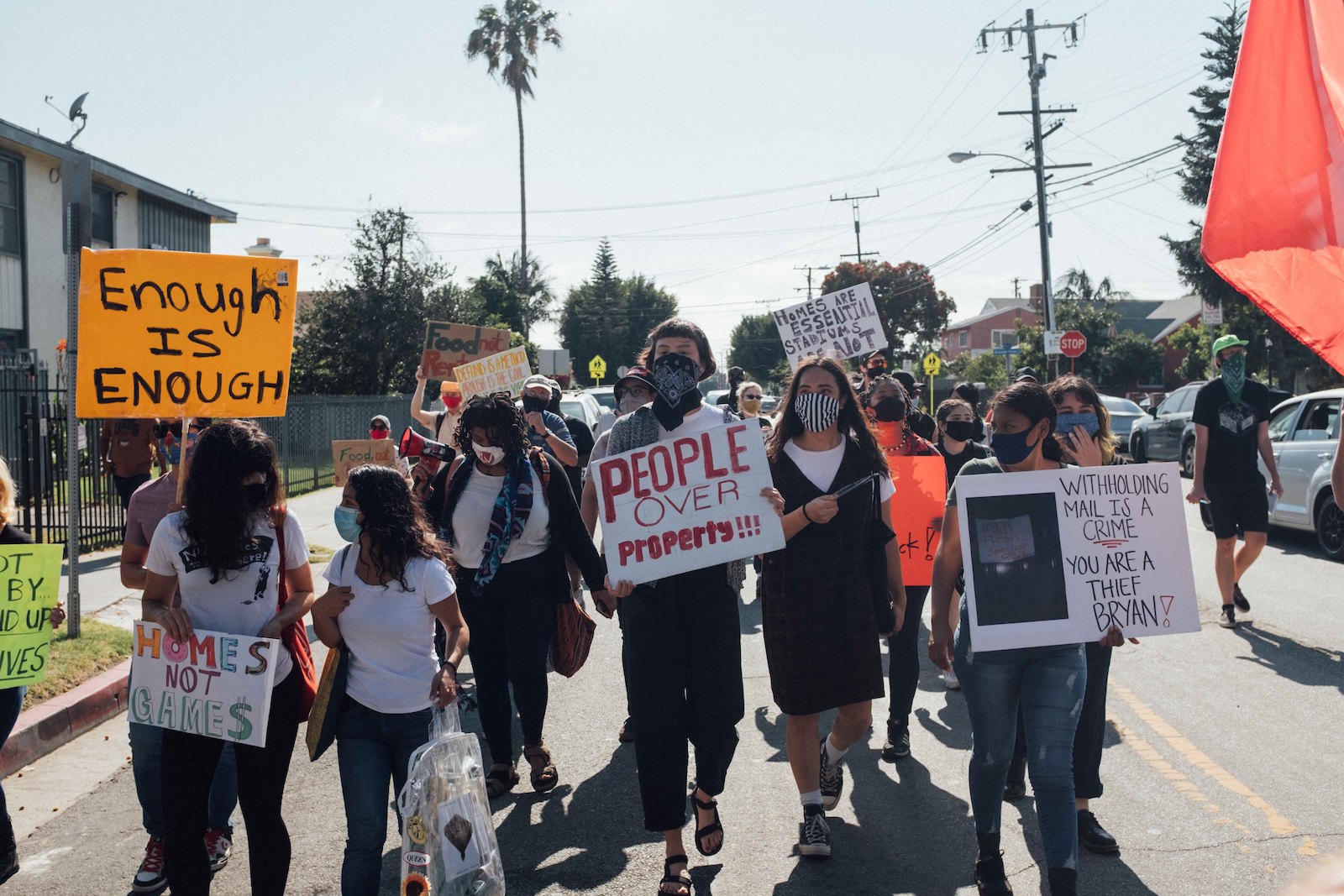
“Clearly people in Inglewood are struggling,” Jonny Coleman, a member of NoOlympicsLA, told Grist. “But officials in LA and Inglewood are trying to pretend that these issues of environmental justice, budgeting, policing, housing, and displacement aren’t happening.”
The current development and transformation of Inglewood follows a pattern set by the city more than 30 years ago when it hosted the 1984 Olympics. While the 1984 games have long been deemed the “most successful” Olympic Games of all time, because they were the only to turn a profit for the host city. However, for many Angelenos — particularly Black, brown, and poor South LA residents — the city was irreversibly transformed.
The games served as a flashpoint for the City of Angels’ growing environmental perils and vast social inequalities. In the years leading up to the games and the decades following, many of the city’s environmental justice problems, such as air pollution, dependence on heavy oil production, and unequal access to parks, clean water, and healthy food, were exacerbated. The games, sponsored by one of the country’s biggest oil companies, led to the city’s airport being expanded by tens of thousands of flights annually and increasing its already deadly volume of emissions.
As a result, historians have linked the 1984 Olympic Games with the 1992 LA Riots, LA’s deepening segregation, and its “bloated and militarized” police force.
Environmental hazards were also felt during the tournament. During the 1980 Olympic Games in Moscow, British athlete Steve Ovett ran the fastest mile and 1500-meter races in history. Four years later in LA, he could barely finish the 800-meter race before collapsing. Los Angeles’ air pollution was so bad that it caused the world-class athlete to experience an asthma attack, he claims.
Despite all of this, on Mayor Garcetti’s first day in office in 2013, he signed a letter to the U.S. Olympic Committee certifying the city’s interest in hosting another tournament. “A lot of people ask me, ‘Why was that your immediate priority when you had so much to do as a mayor?’” he later recalled. “But as anyone who was here for those 1984 Games, those 16 days transformed our city, touched each one of us, that legacy still resounds here strongly every single day.”
This story was originally published by Grist with the headline The environmental justice fight to block the 2028 Olympics in Los Angeles on Oct 12, 2021.
